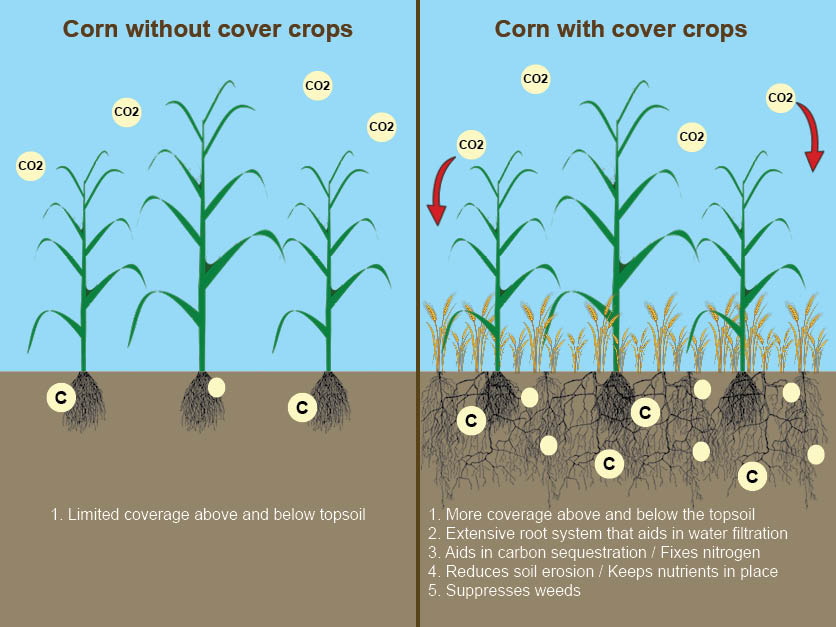Benefits of Cover Crops
Cover crops are an essential component of sustainable agriculture practices. They offer numerous benefits that contribute to soil health, crop productivity, and environmental sustainability. In this article, we will explore the various advantages of incorporating cover crops into your farming system.
Improved Soil Fertility
Cover crops play a crucial role in enhancing soil fertility. By fixing atmospheric nitrogen, cover crops such as legumes can replenish the soil with this essential nutrient. This reduces the need for synthetic fertilizers, saving costs and minimizing environmental impact. Additionally, cover crops help improve soil structure, promoting better water infiltration, reducing erosion, and enhancing nutrient retention.
Weed Suppression
One of the significant benefits of cover crops is their ability to suppress weeds. By providing a dense ground cover, cover crops compete with weeds for sunlight, water, and nutrients, effectively reducing weed growth. This natural weed control method can significantly reduce the need for herbicides, making it an environmentally friendly approach.
Enhanced Water Management
Cover crops play a vital role in managing water resources efficiently. Their extensive root systems improve soil porosity, allowing better water infiltration and reducing surface runoff. This helps prevent soil erosion and nutrient leaching. Additionally, cover crops act as a living mulch, reducing evaporation and conserving soil moisture during dry periods.
Pest and Disease Control
Integrating cover crops into your farming system can contribute to pest and disease control. Some cover crops, such as mustard, can release natural compounds that suppress certain pests and pathogens. Additionally, cover crops attract beneficial insects and predators that help control pest populations. This reduces the reliance on synthetic pesticides and promotes a more balanced ecosystem within the agricultural landscape.
Enhanced Biodiversity
Cover crops provide habitat and food sources for a wide range of beneficial organisms. They attract pollinators, such as bees and butterflies, which are essential for crop pollination. Moreover, cover crops support soil microorganisms, including beneficial bacteria and fungi, which contribute to nutrient cycling and overall soil health. By promoting biodiversity, cover crops create a more resilient and sustainable farming ecosystem.
Reduced Soil Erosion
Soil erosion is a significant concern in agriculture, leading to the loss of topsoil and nutrient depletion. Cover crops are highly effective in reducing soil erosion by protecting the soil surface from wind and water erosion. Their extensive root systems bind the soil particles together, preventing them from being washed or blown away. This helps maintain soil fertility and productivity, ensuring the long-term sustainability of farming practices.

FAQs about benefits of cover crops
1. What are cover crops?
Answer: Cover crops are plants that are grown primarily to benefit the soil and surrounding ecosystem rather than for harvest.
2. What are the benefits of using cover crops?
Answer: Cover crops provide numerous benefits such as improving soil fertility, reducing soil erosion, suppressing weeds, and enhancing biodiversity.
3. How do cover crops improve soil fertility?
Answer: Cover crops add organic matter to the soil, increase nutrient availability, improve soil structure, and enhance microbial activity, all of which contribute to improved soil fertility.
4. Can cover crops help in reducing soil erosion?
Answer: Yes, cover crops protect the soil from erosion by reducing the impact of raindrops, improving water infiltration, and holding the soil in place with their root systems.
5. Do cover crops help in weed suppression?
Answer: Absolutely! Cover crops compete with weeds for sunlight, nutrients, and space, effectively suppressing weed growth and reducing the need for herbicides.
6. How do cover crops enhance biodiversity?
Answer: Cover crops provide habitat and food sources for beneficial insects, birds, and other wildlife, contributing to increased biodiversity on farms and in surrounding areas.
7. Can cover crops improve water quality?
Answer: Yes, cover crops help in reducing nutrient runoff by absorbing excess nitrogen and phosphorus from the soil, thus preventing them from entering water bodies and causing pollution.
8. Do cover crops have any impact on climate change?
Answer: Cover crops sequester carbon dioxide from the atmosphere, acting as a natural carbon sink and helping mitigate climate change by reducing greenhouse gas emissions.
9. Are there any economic benefits to using cover crops?
Answer: Yes, cover crops can lead to cost savings by reducing the need for synthetic fertilizers, herbicides, and pesticides, as well as by improving crop yields and overall farm profitability.
10. How can I get started with cover crops?
Answer: To get started with cover crops, you can consult with local agricultural extension services, farmers, or agricultural experts who can provide guidance on suitable cover crop species, planting methods, and management practices.
Incorporating cover crops into your farming system offers a multitude of benefits. From improving soil fertility and suppressing weeds to enhancing water management and promoting biodiversity, cover crops play a vital role in sustainable agriculture. By implementing cover cropping practices, farmers can reduce their environmental impact, enhance crop productivity, and contribute to a more resilient and sustainable food production system.




